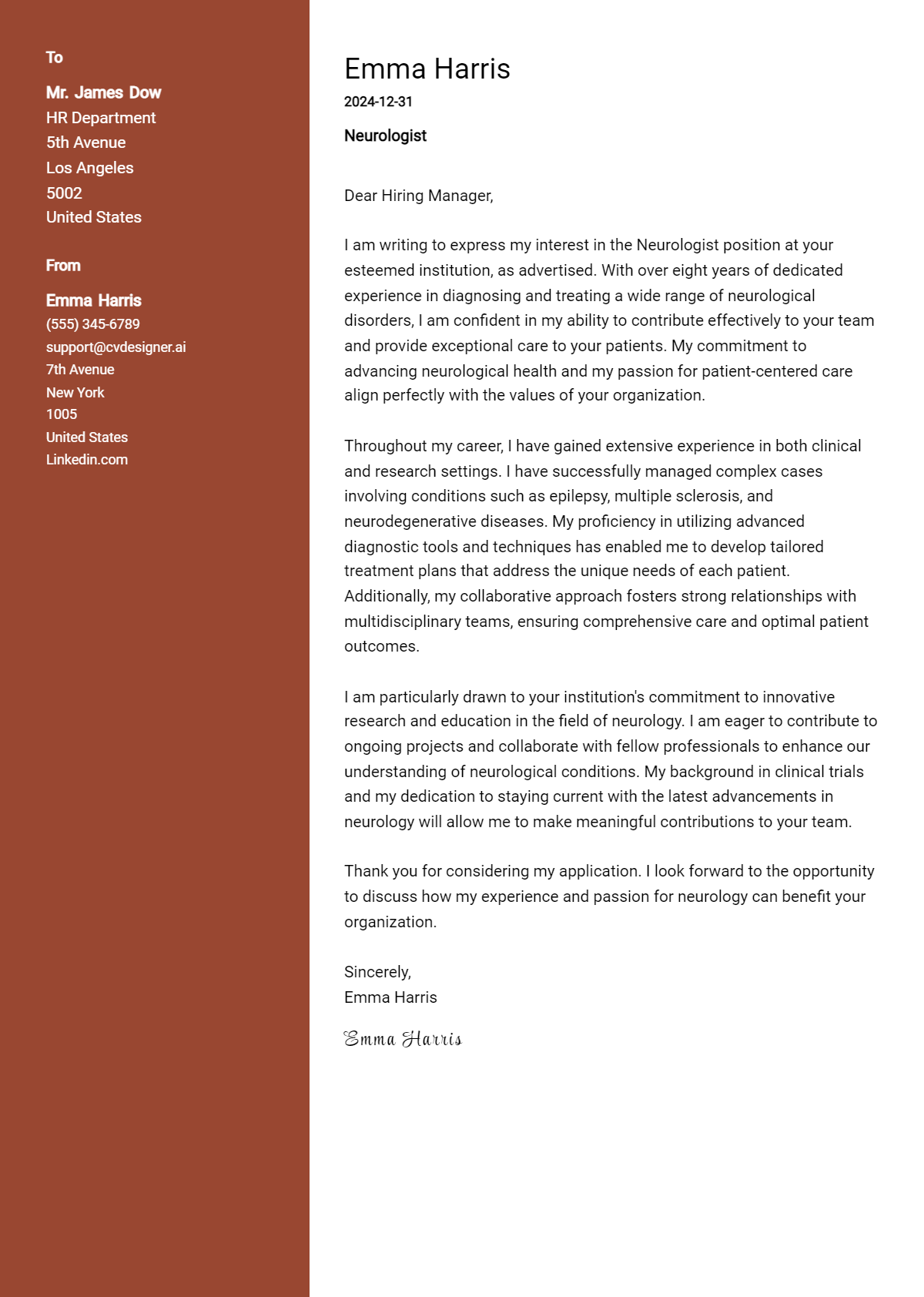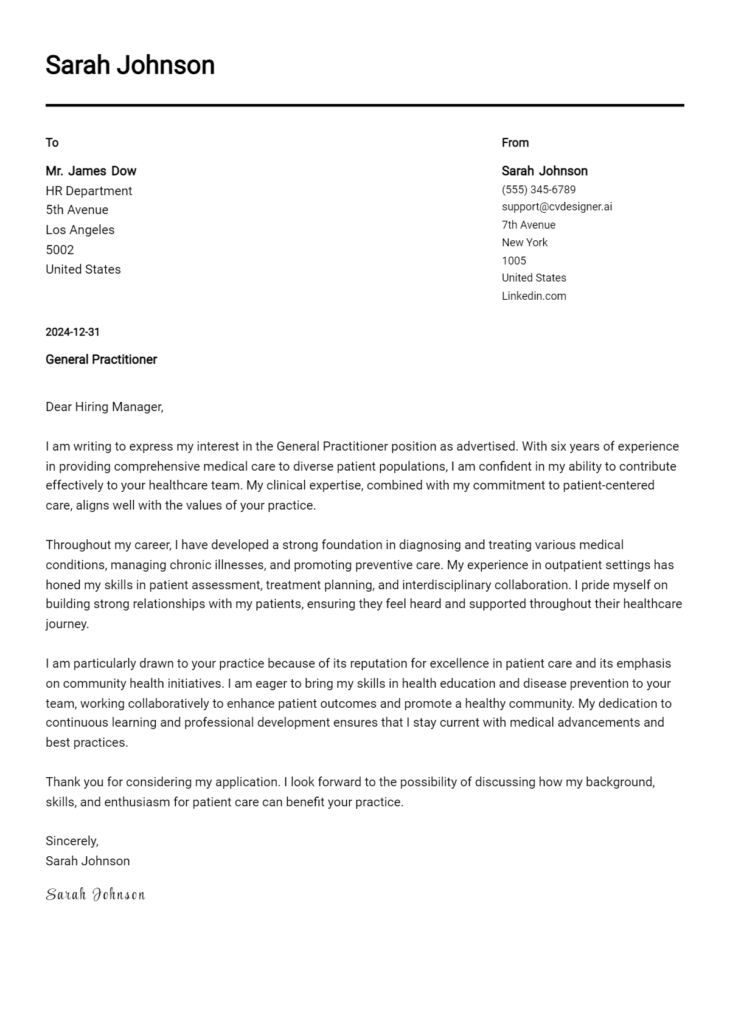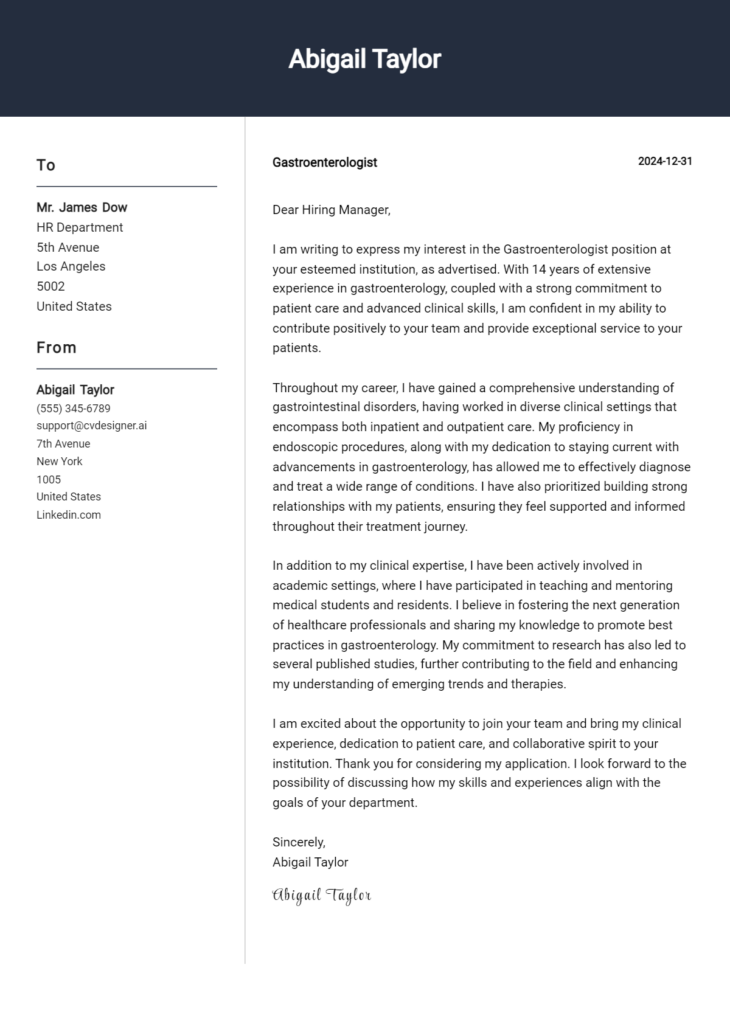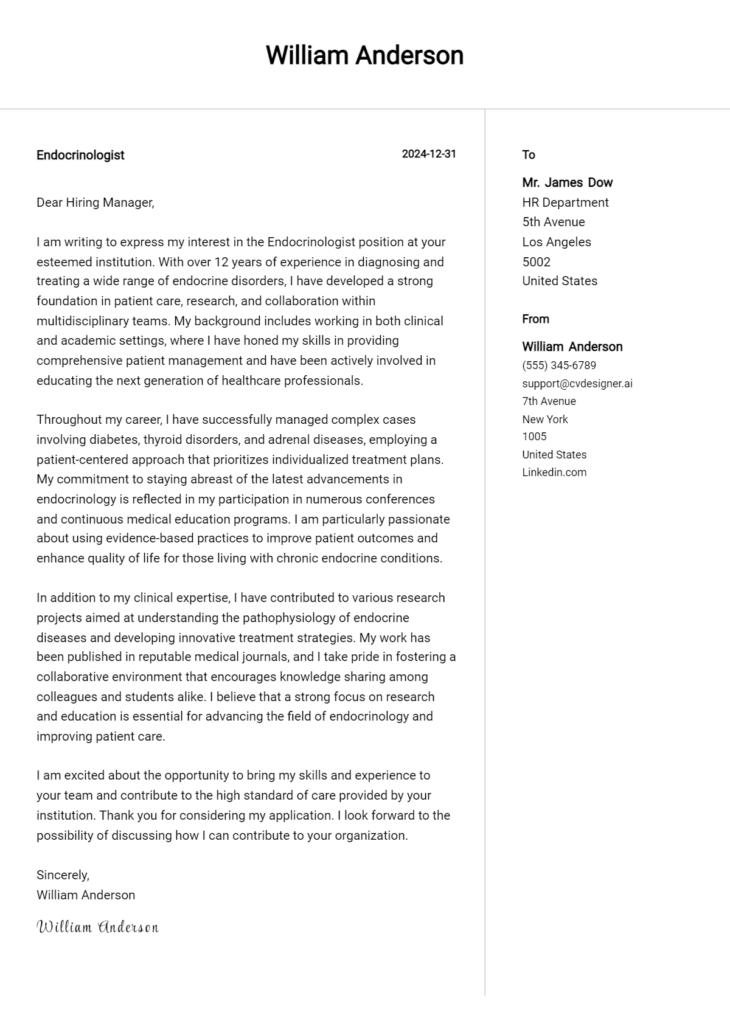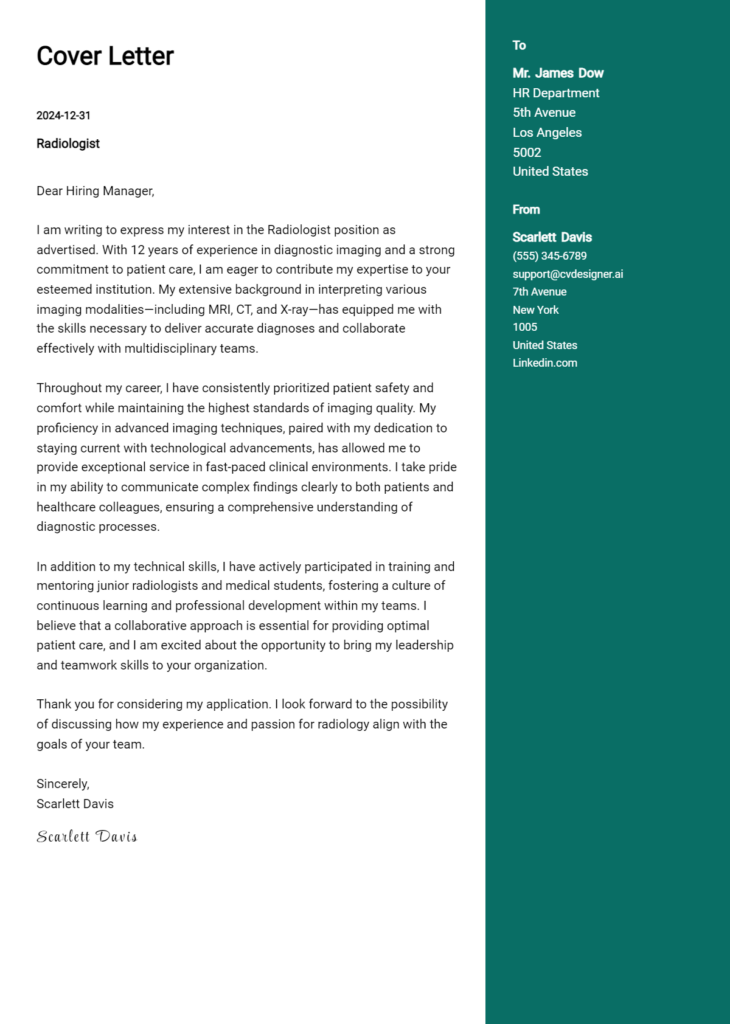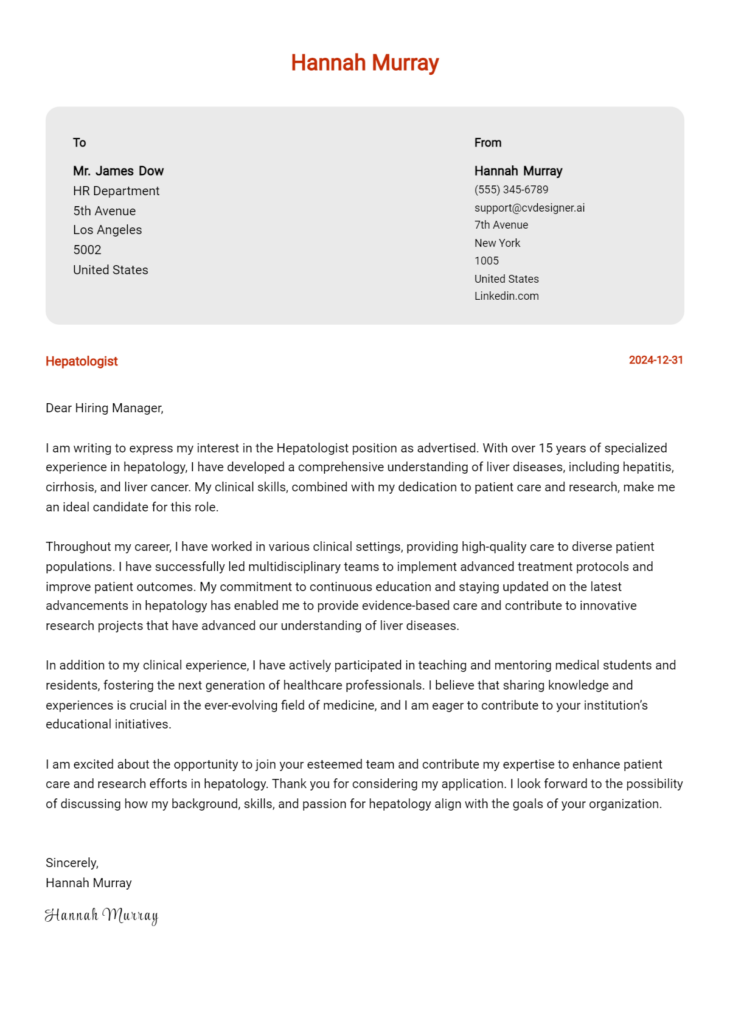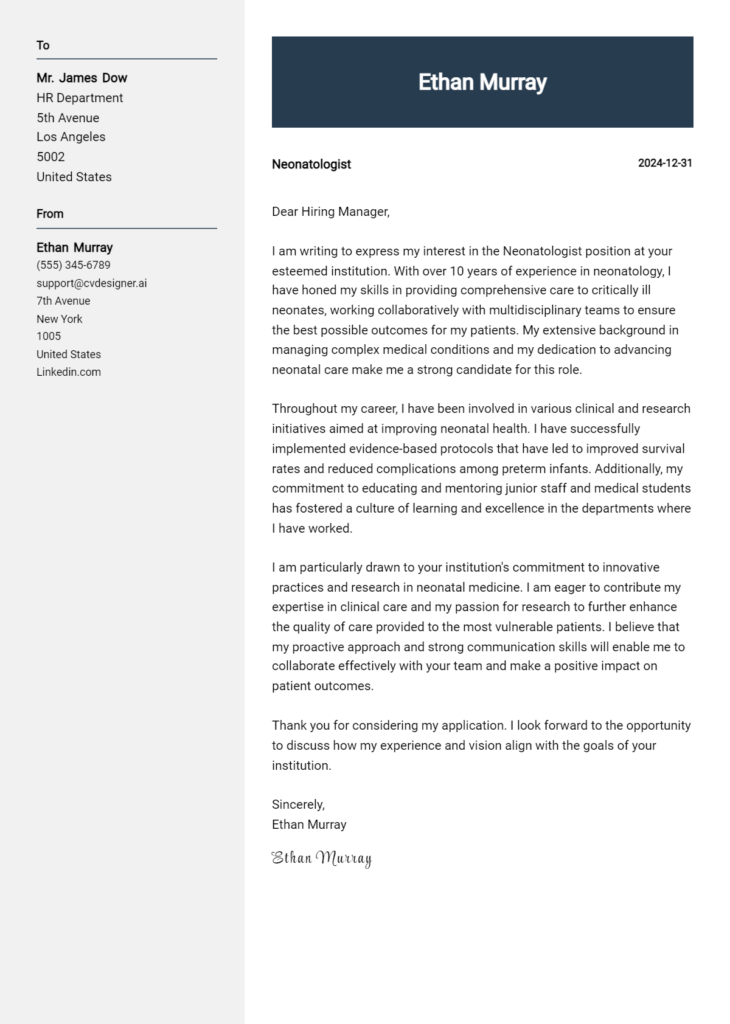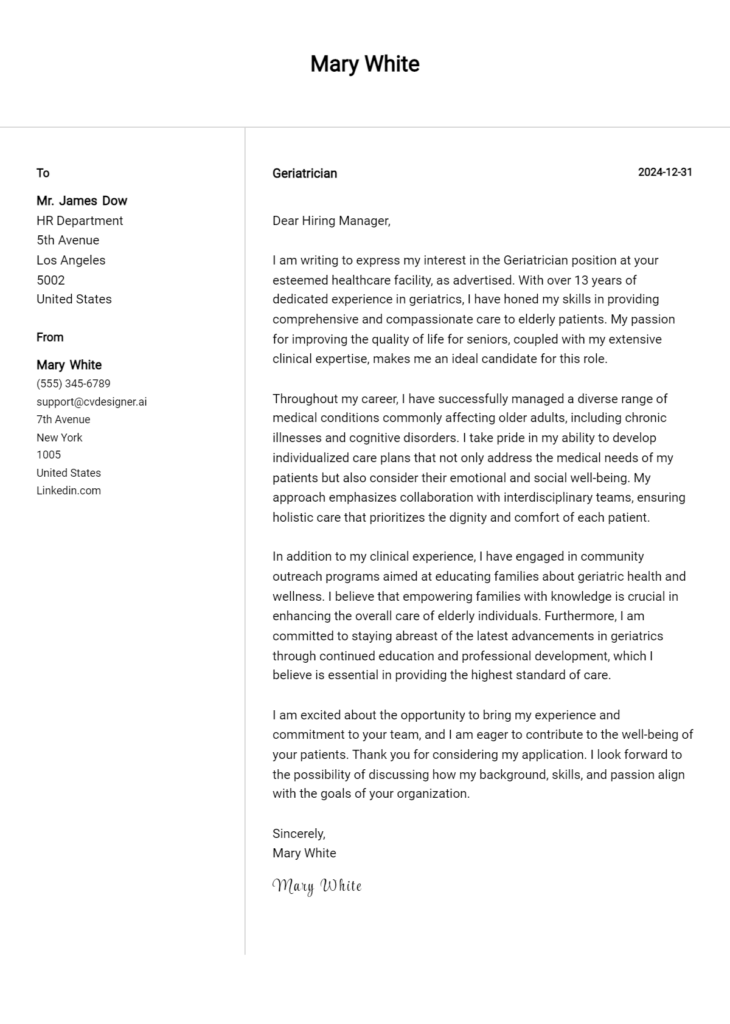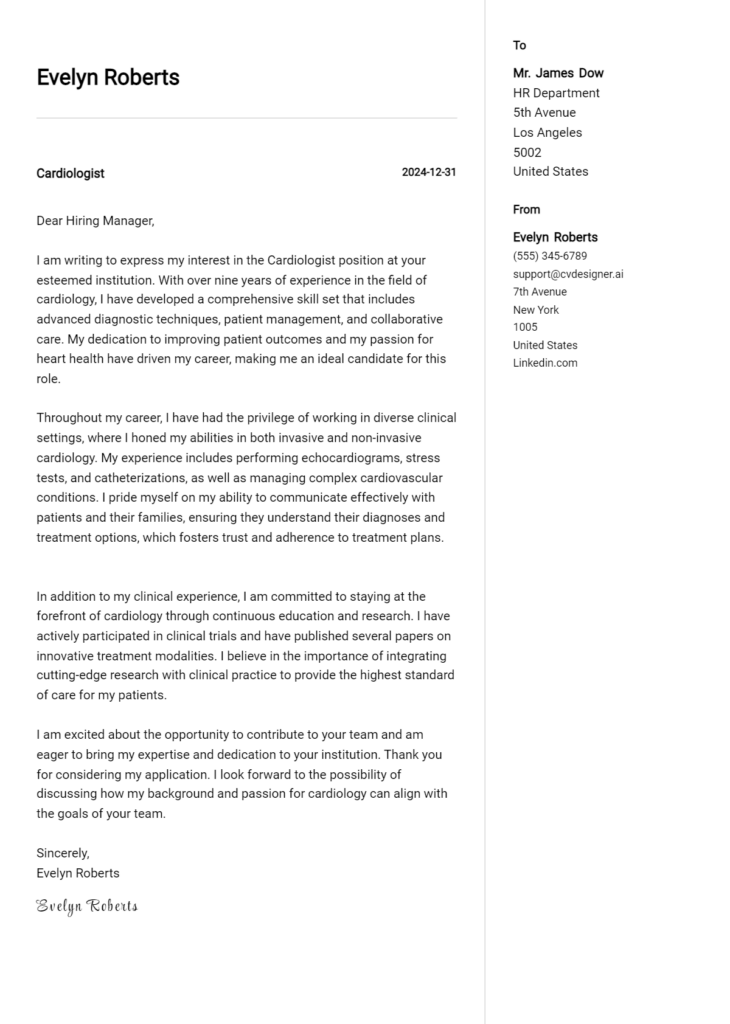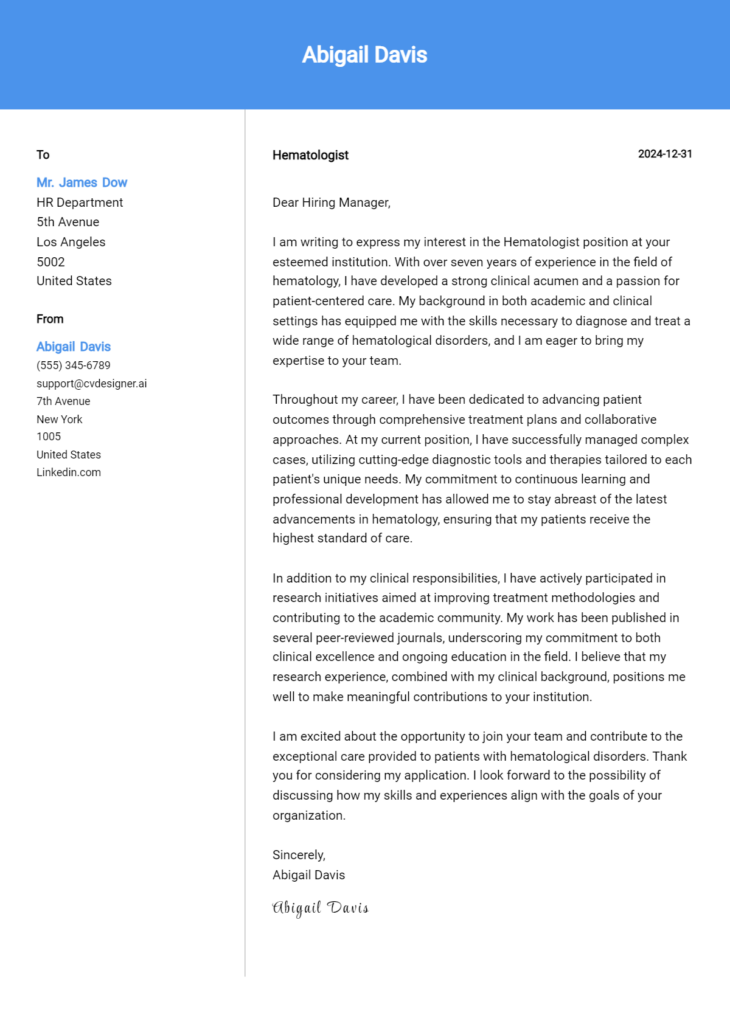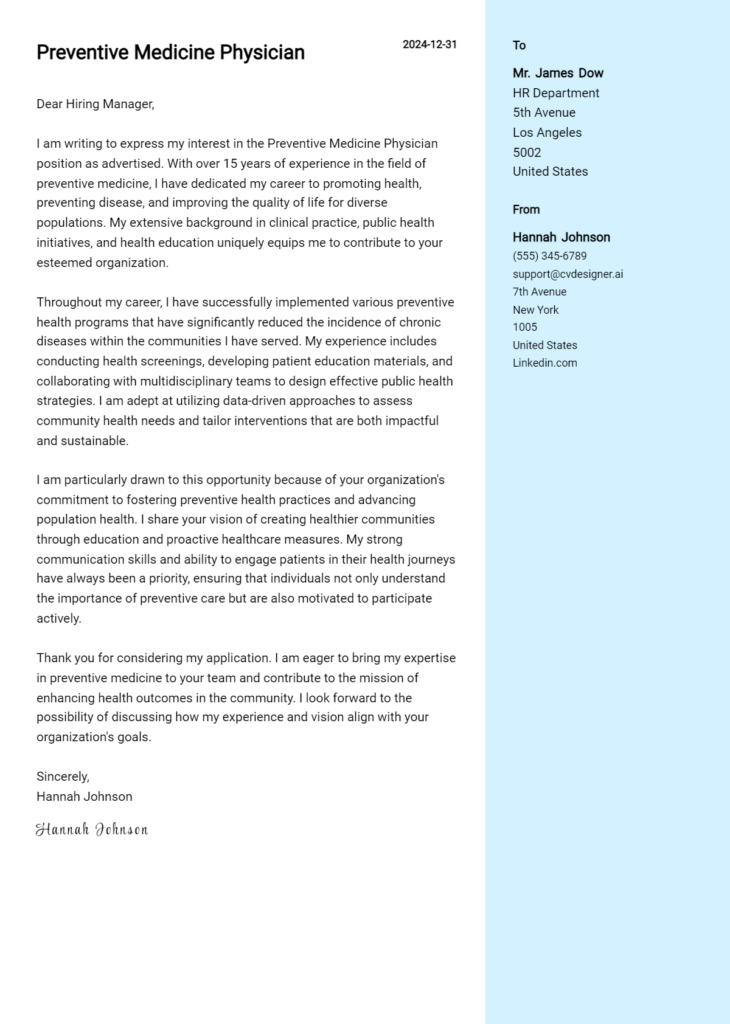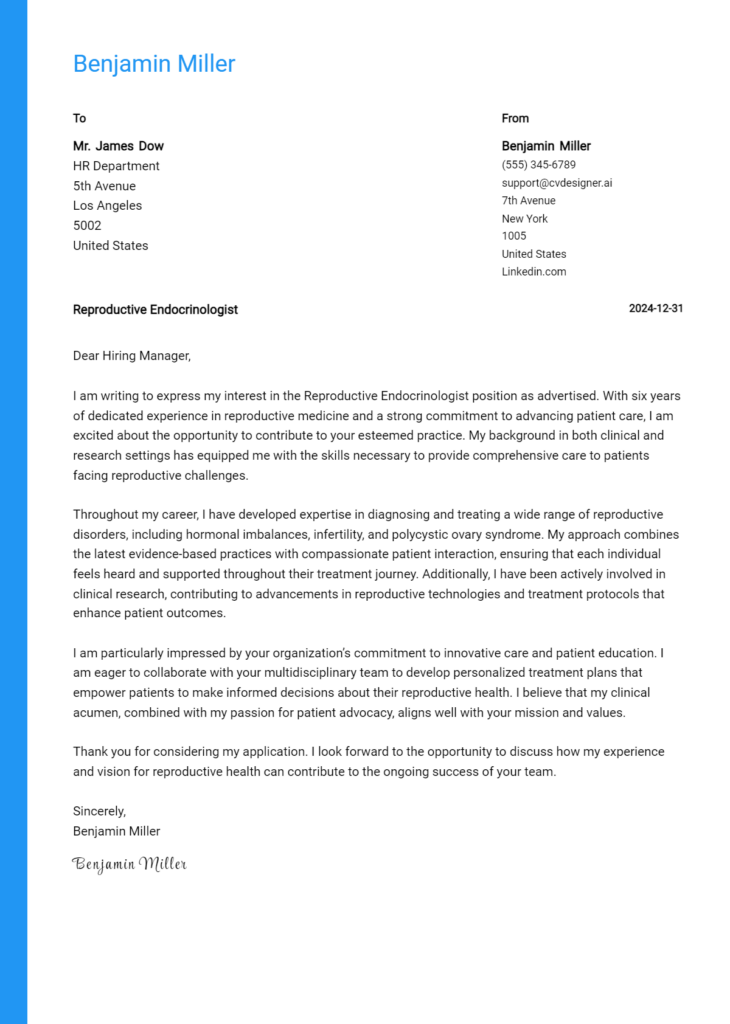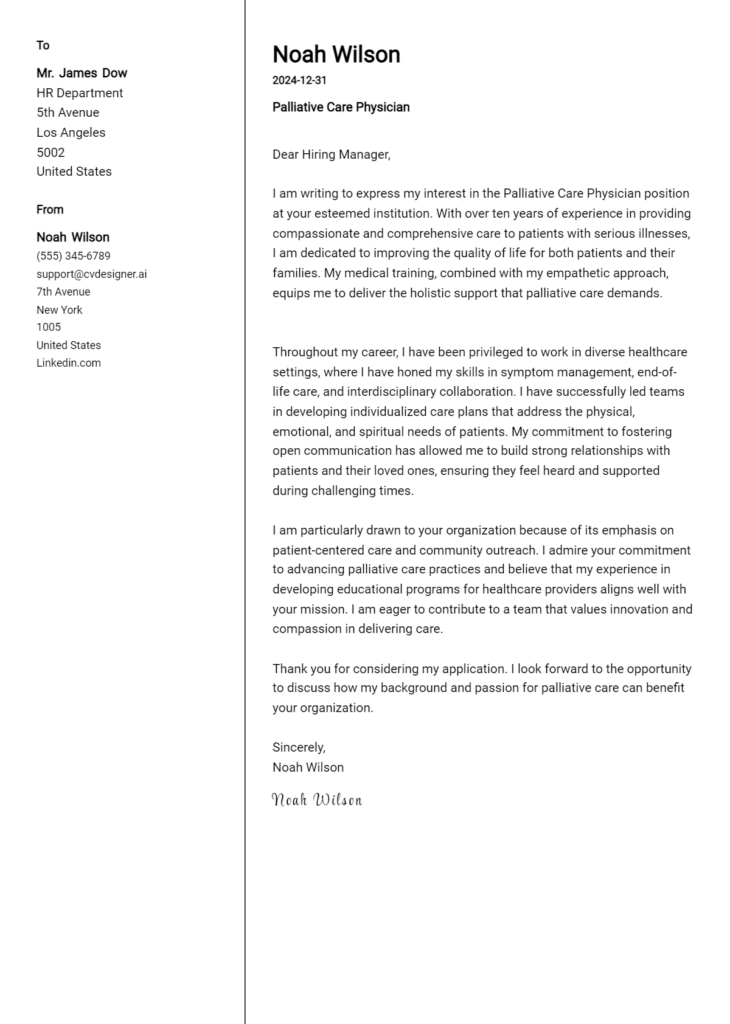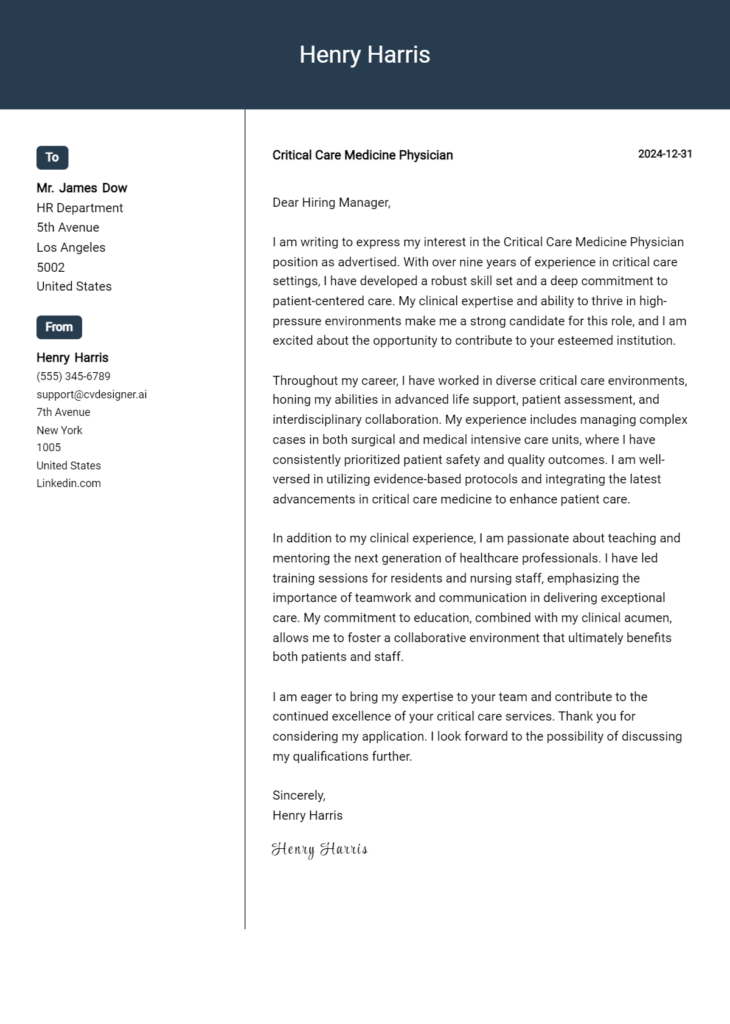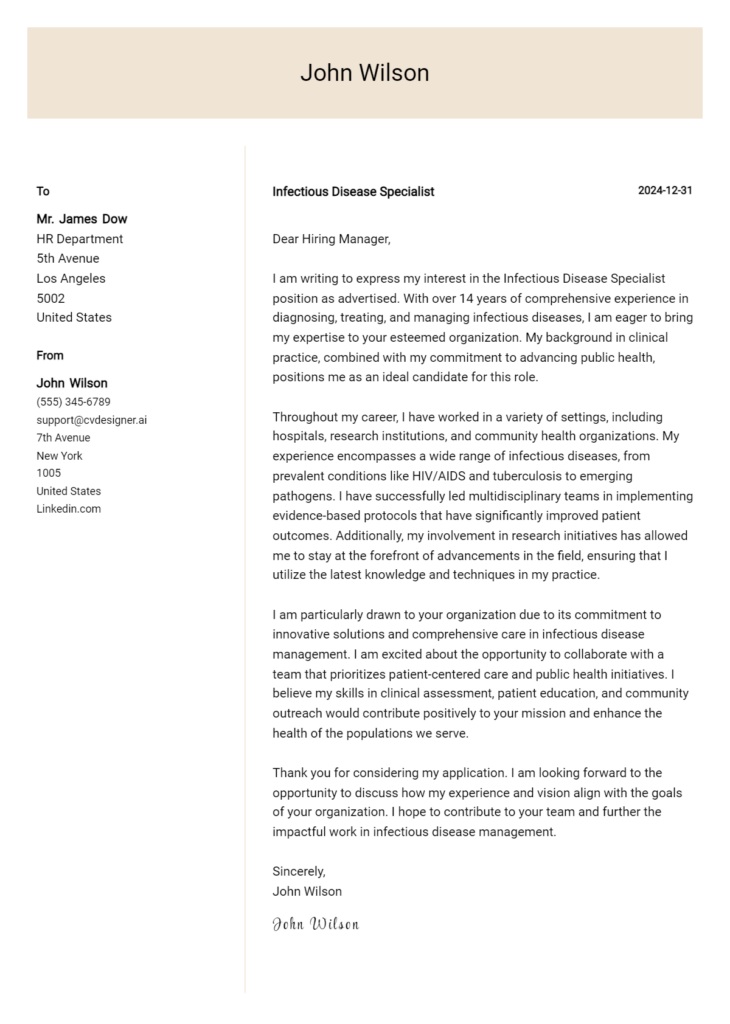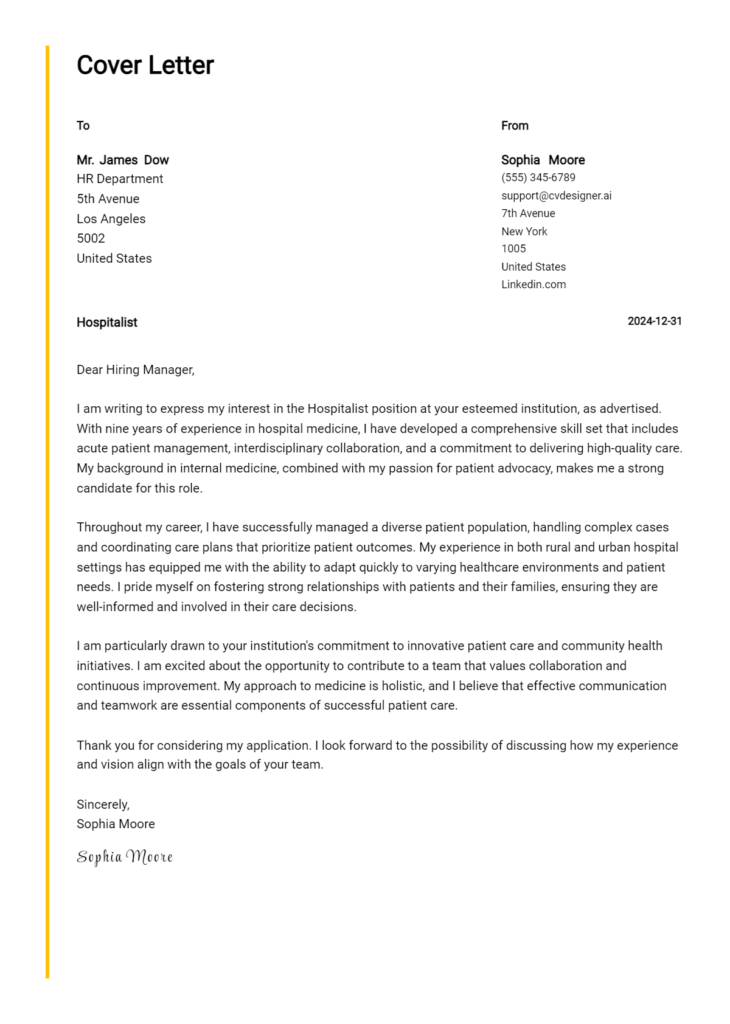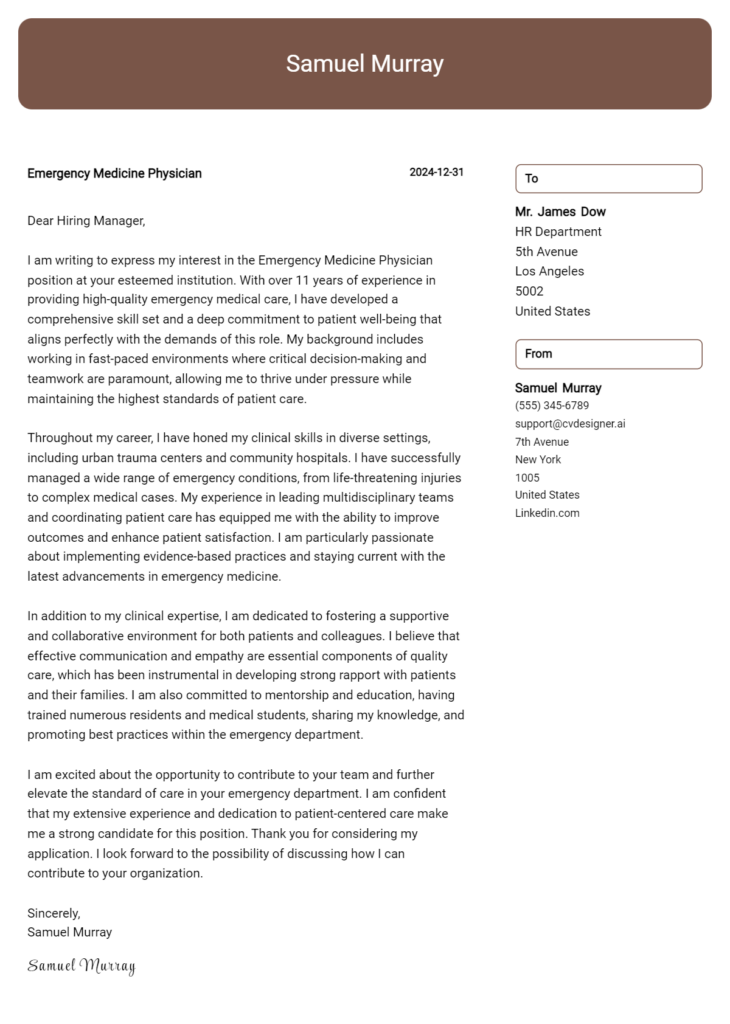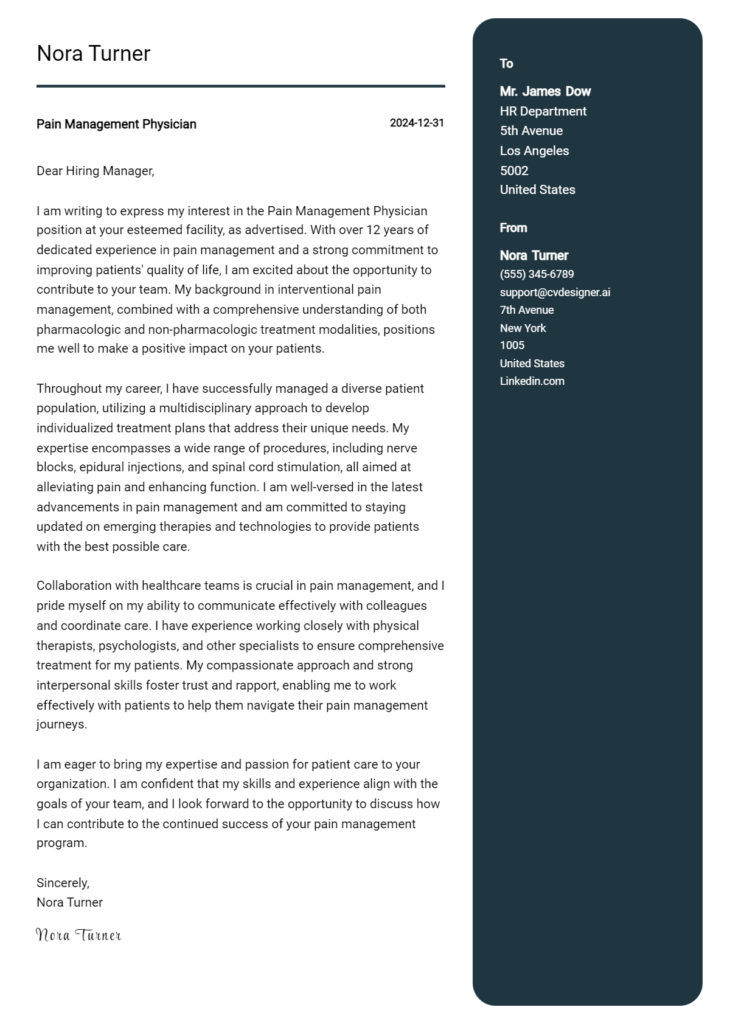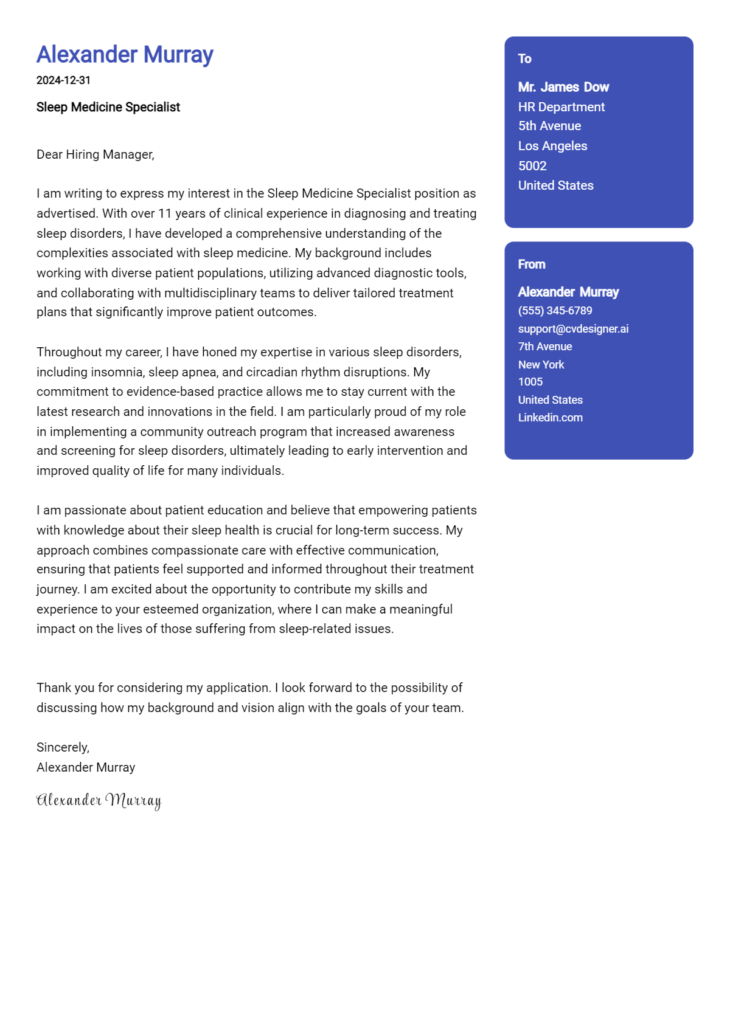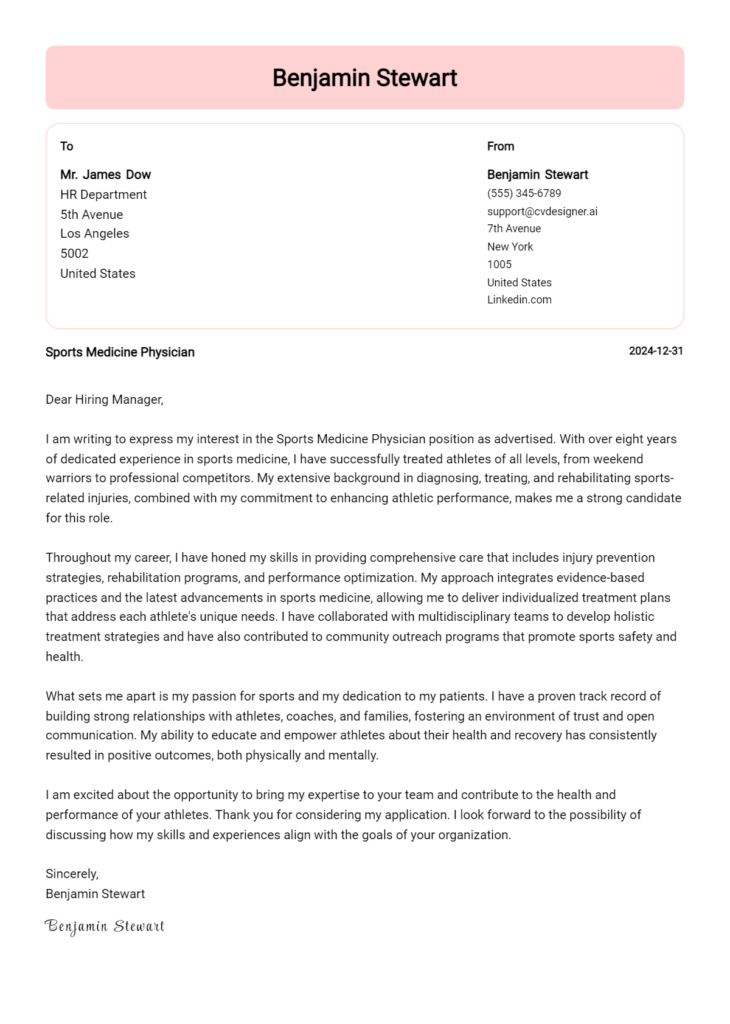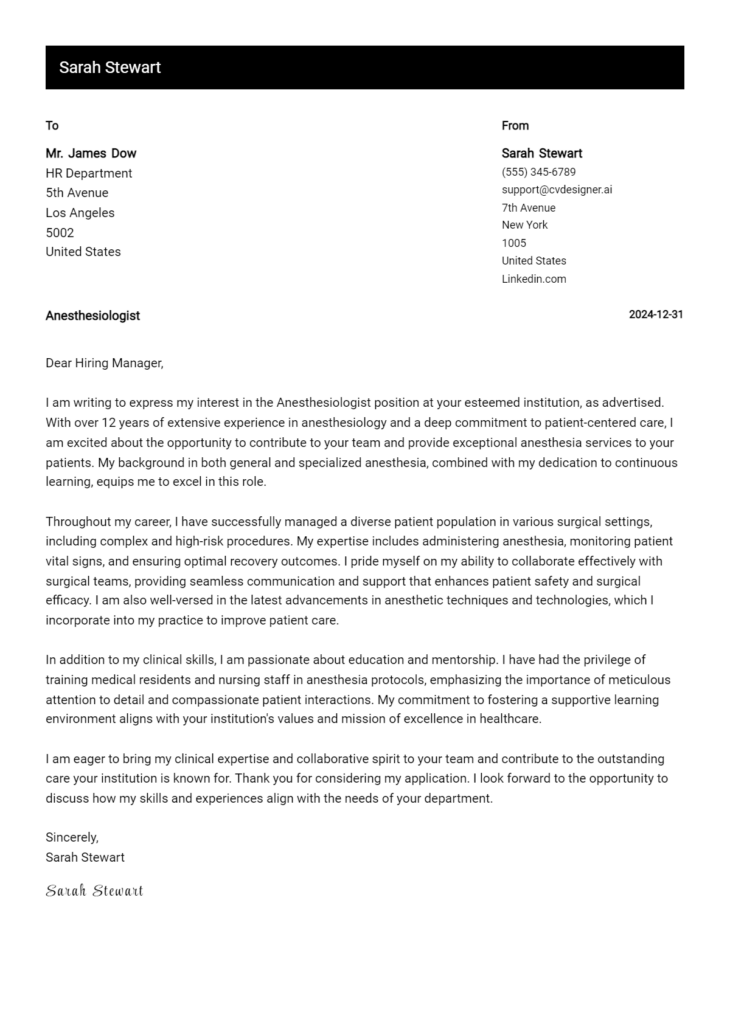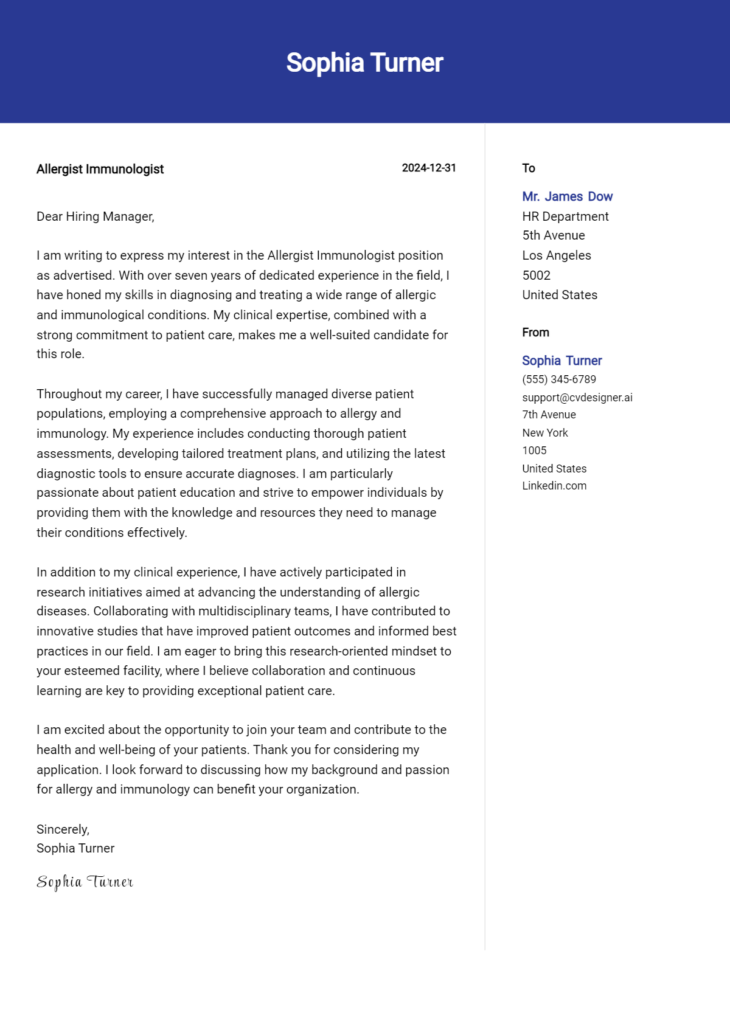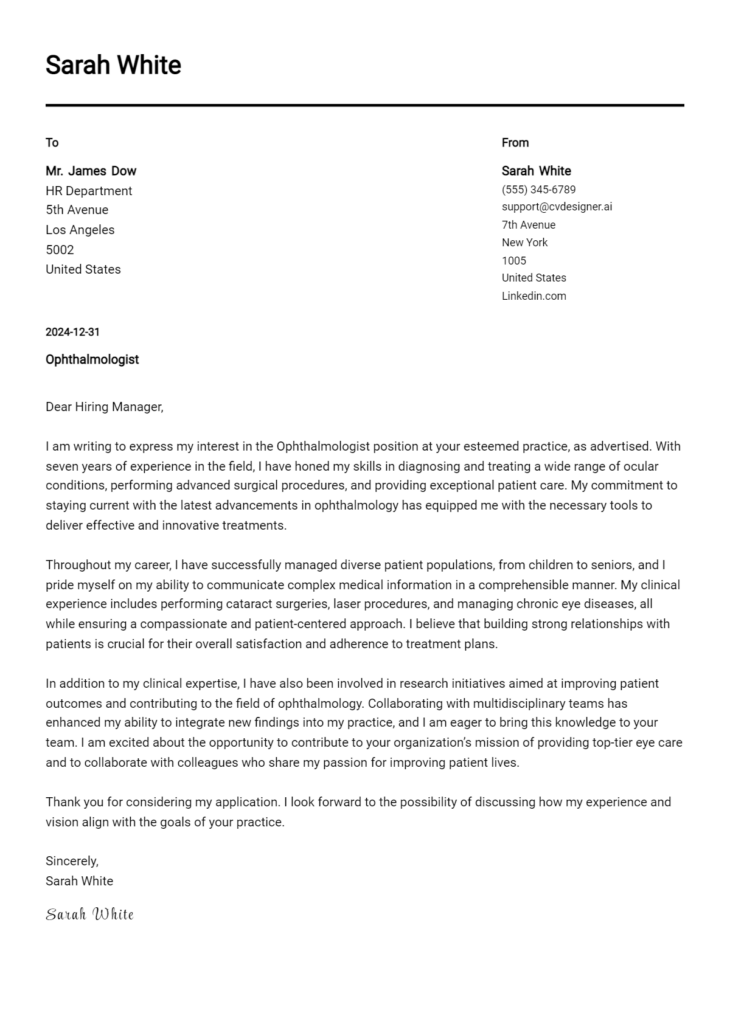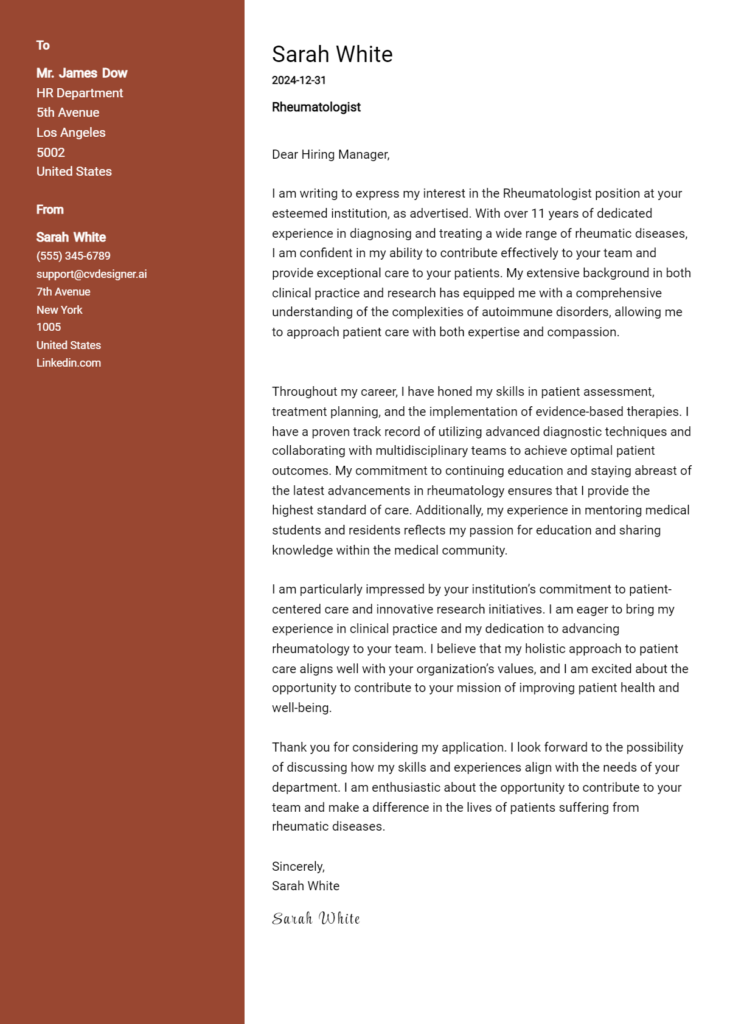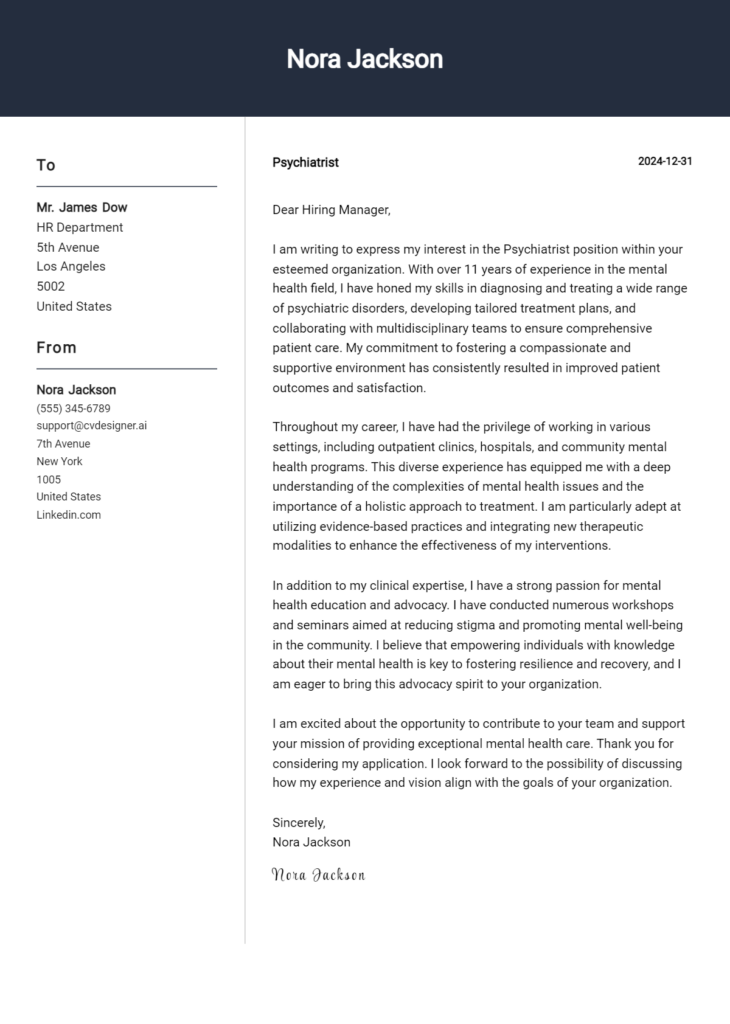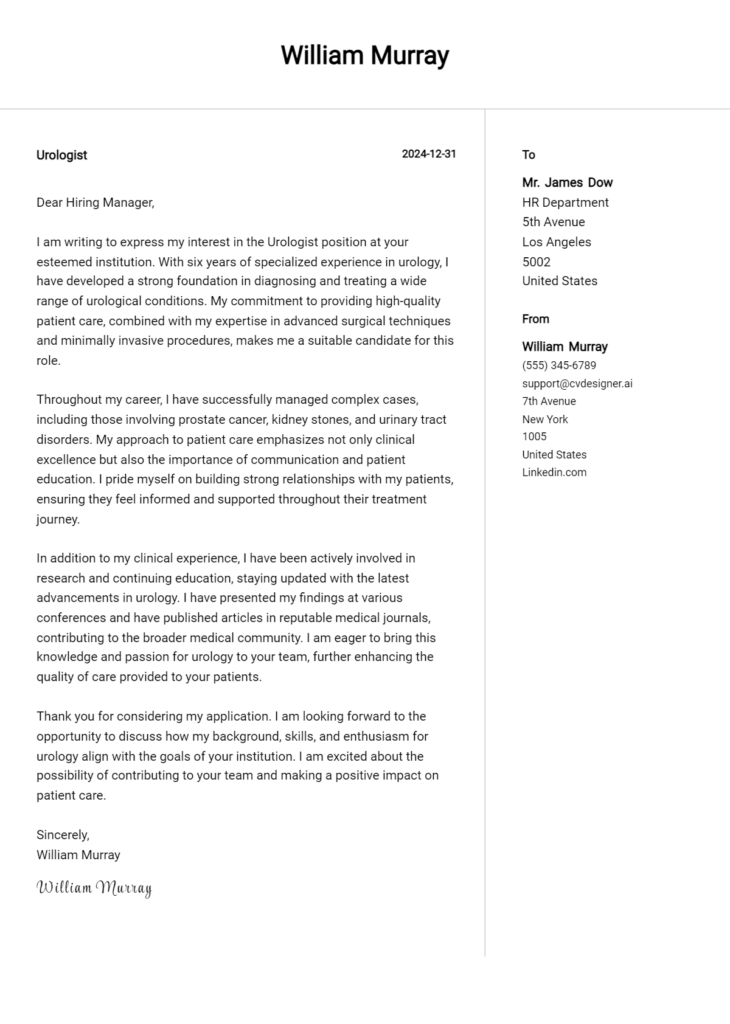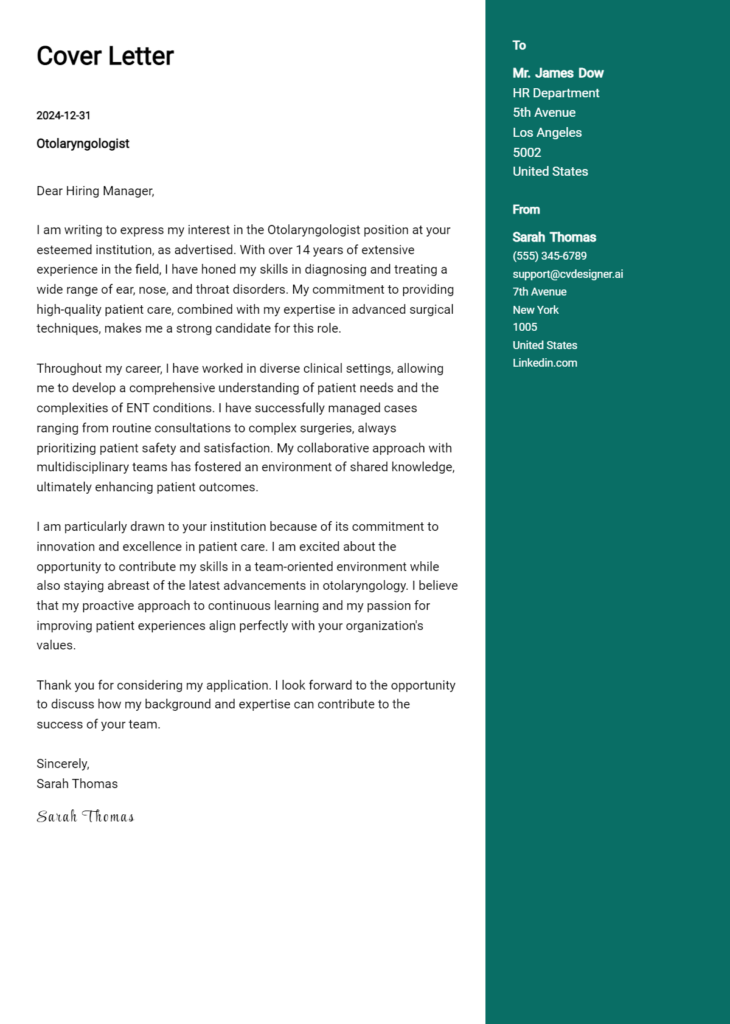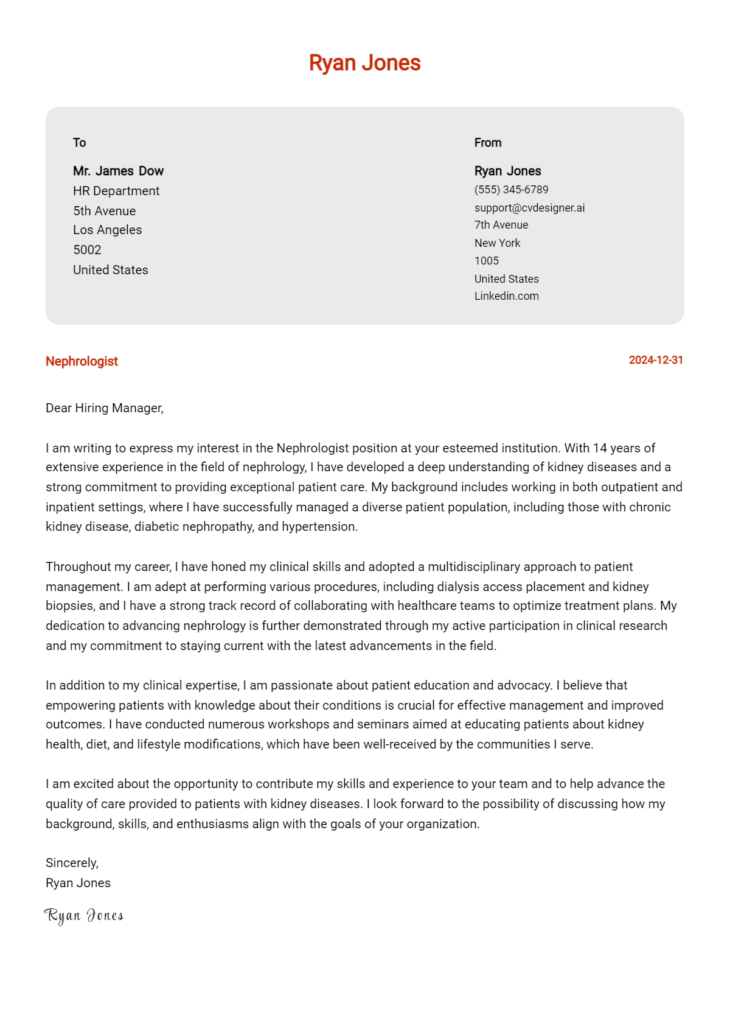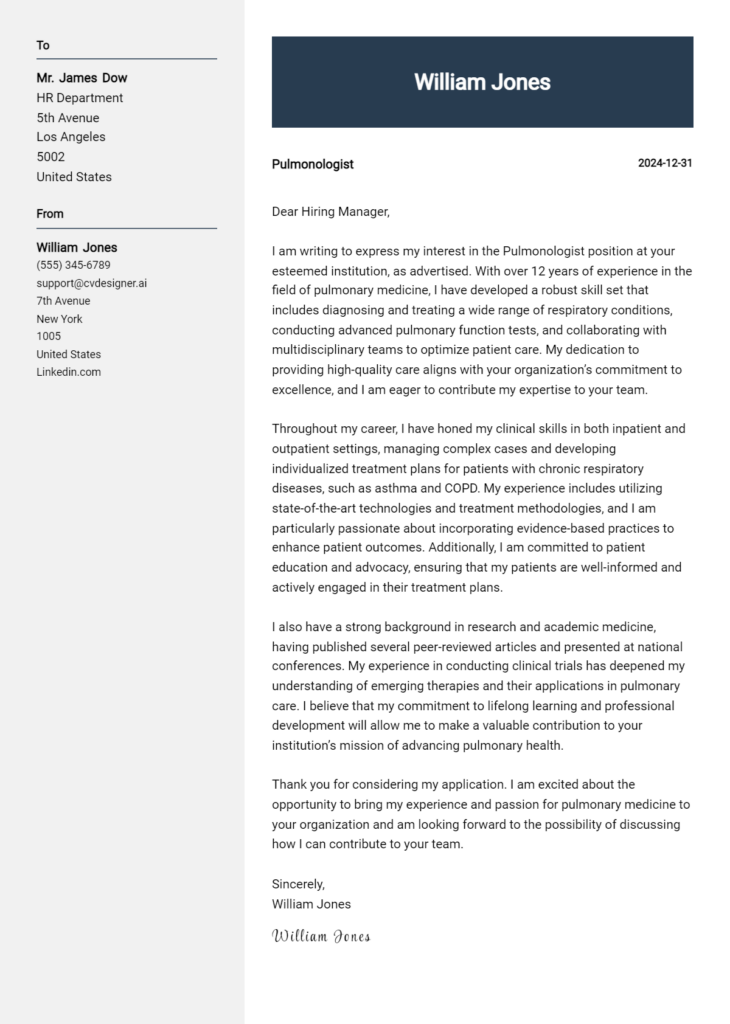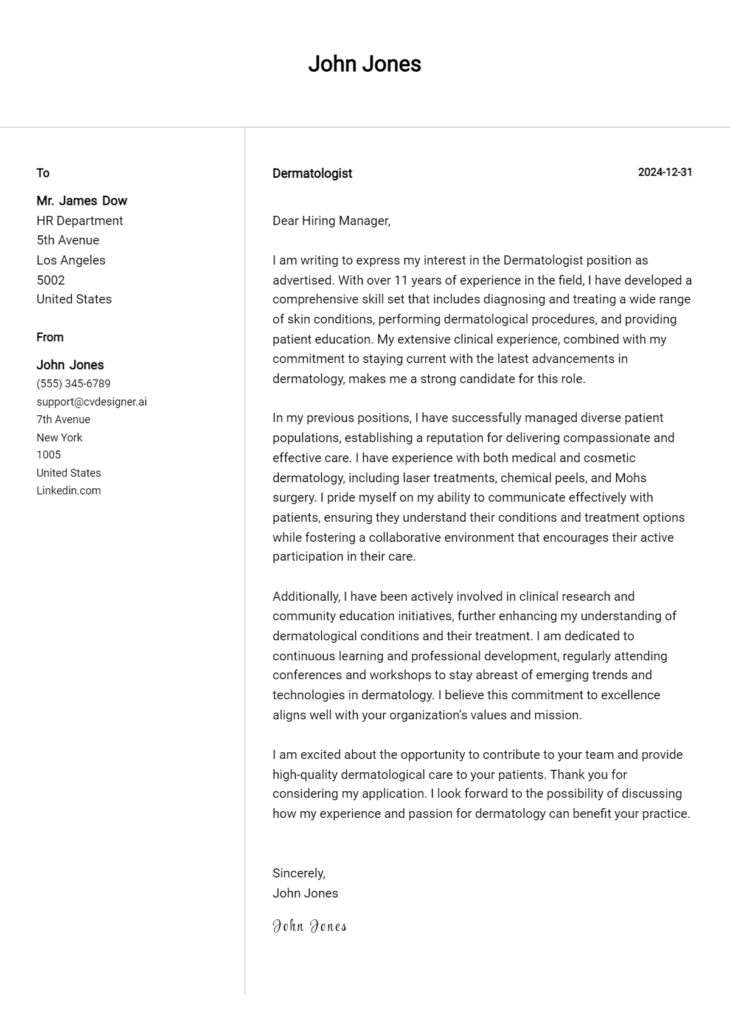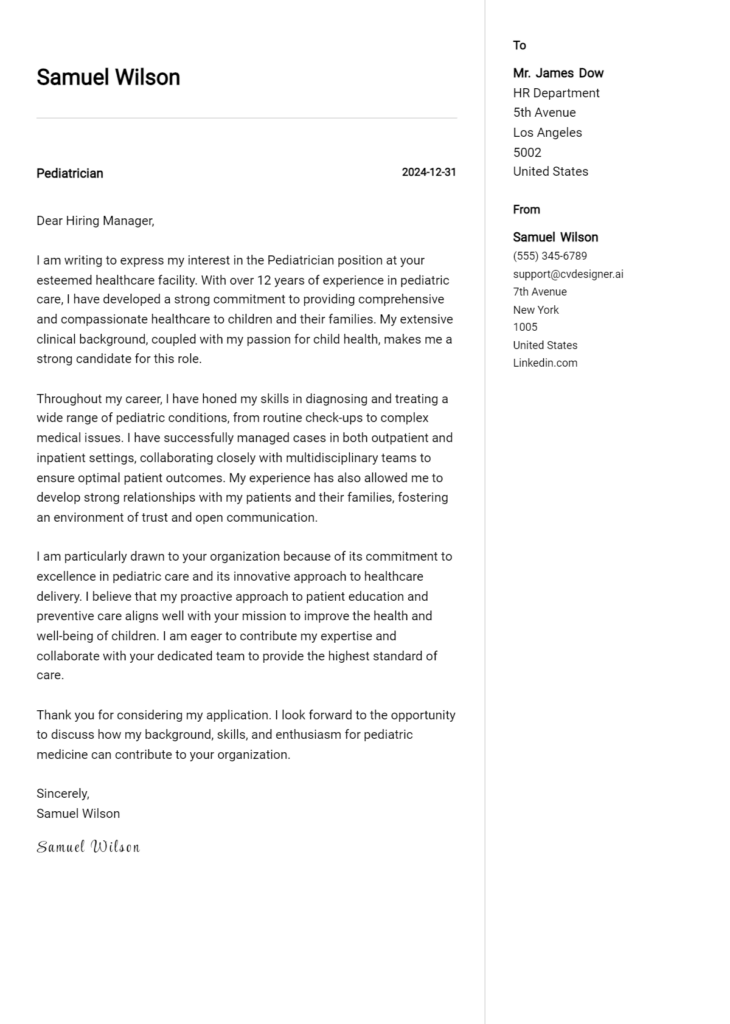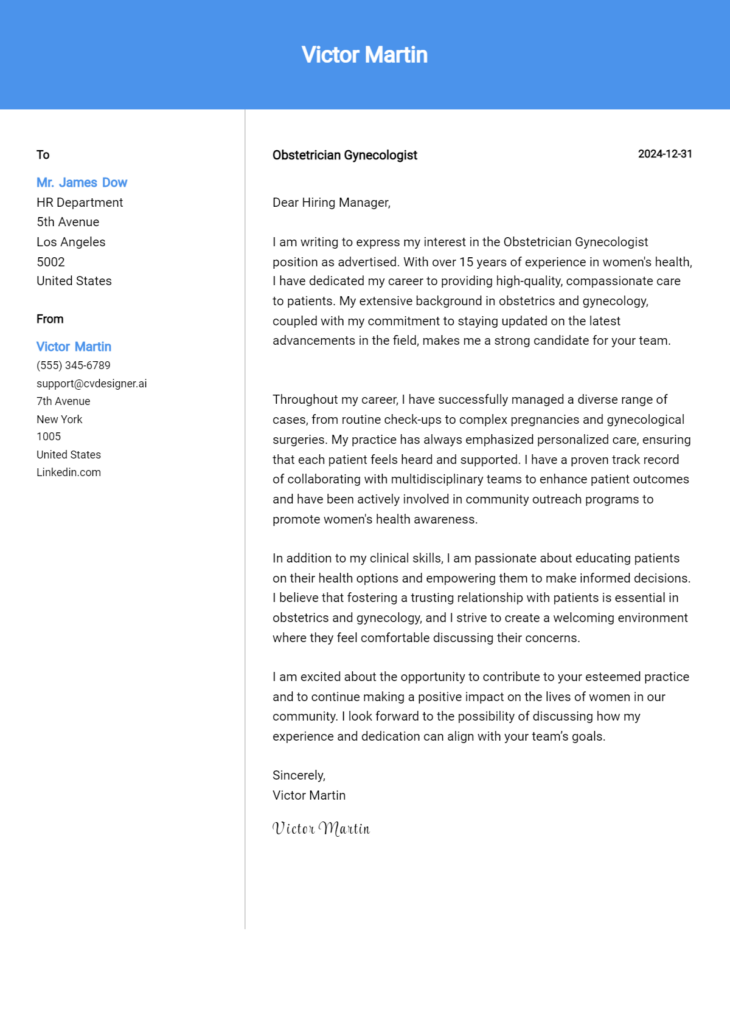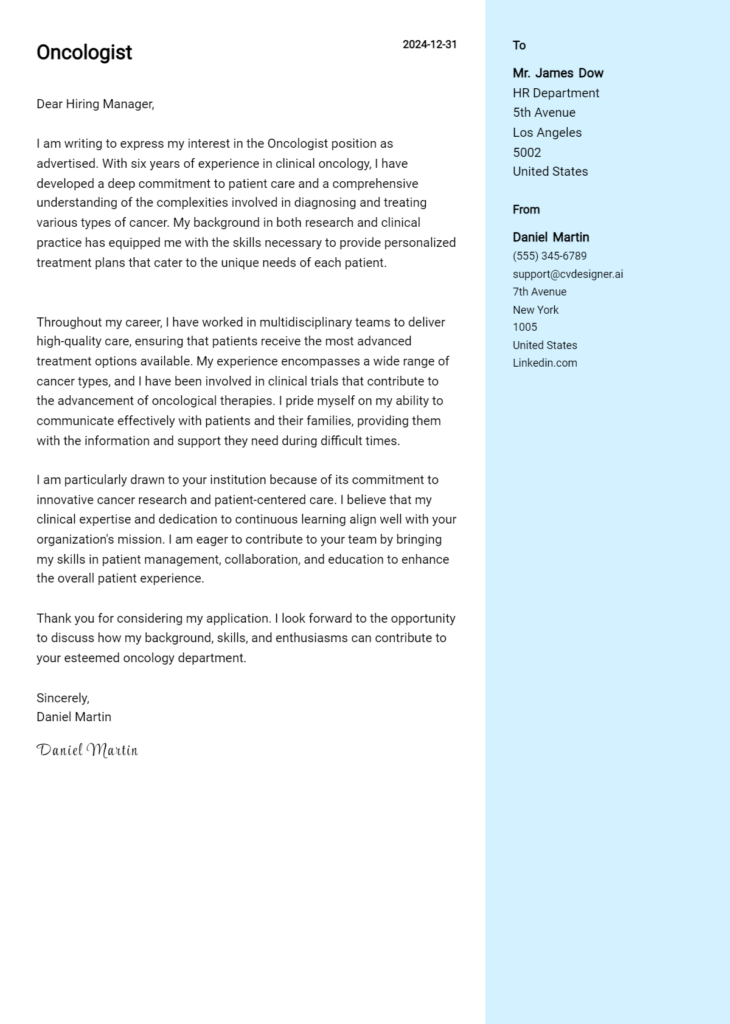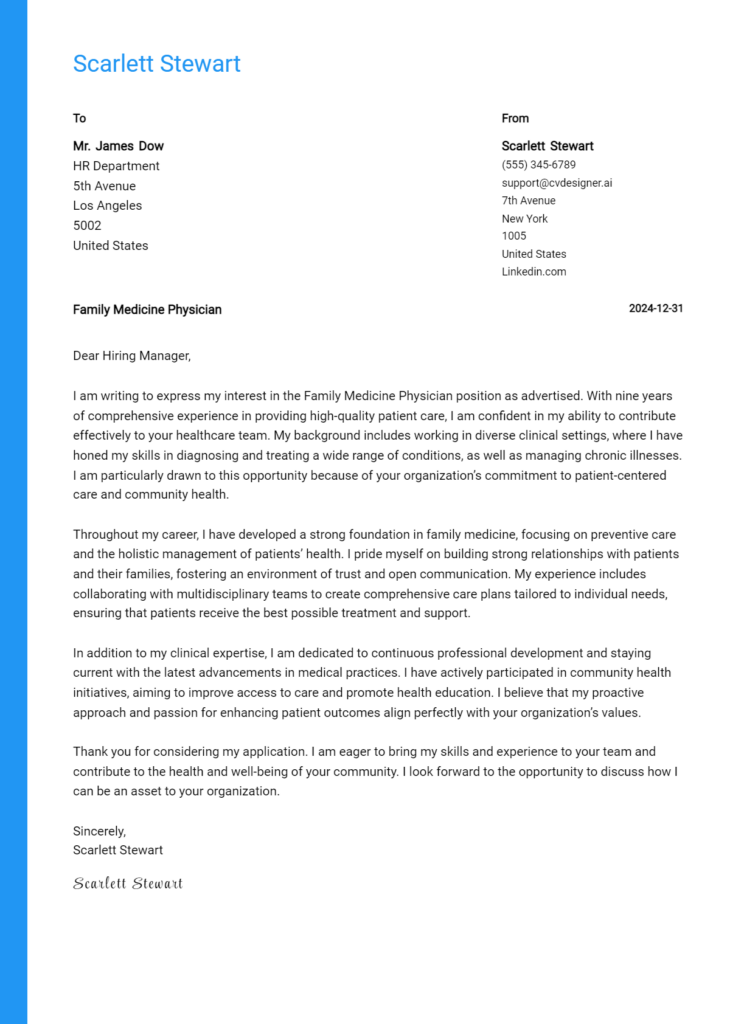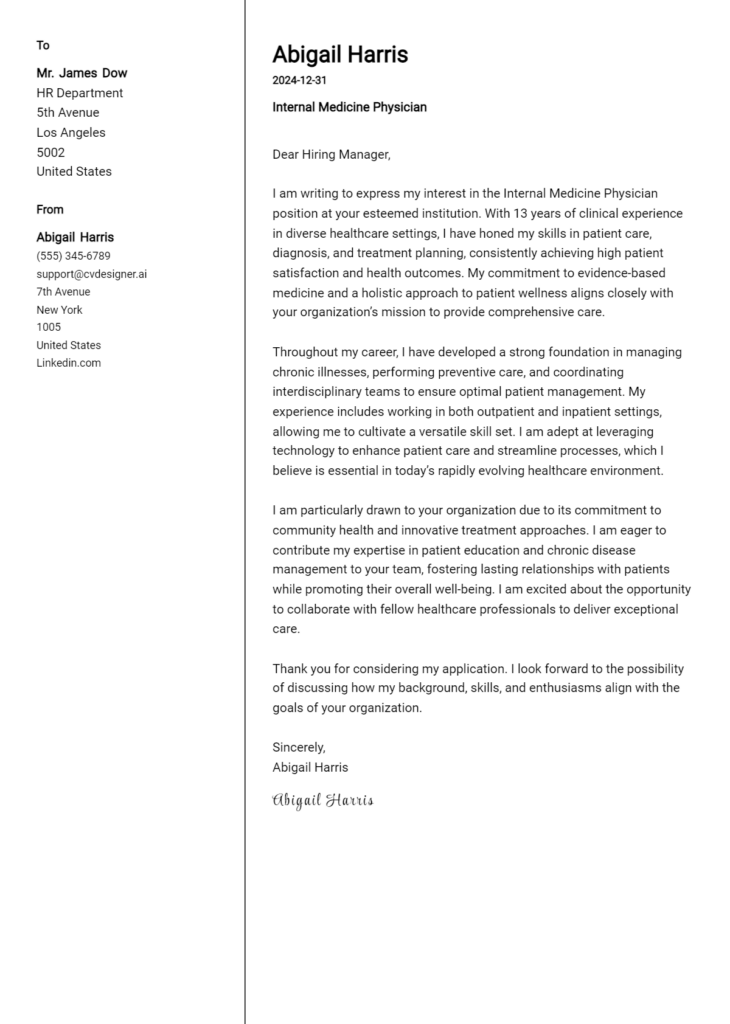Neurologist Cover Letter Examples
Explore additional Neurologist cover letter samples and guides and see what works for your level of experience or role.
How to Format a Neurologist Cover Letter?
Crafting a compelling cover letter is essential for neurologists, as it not only presents your qualifications but also reflects your expertise in a highly specialized field. The way you format your cover letter can greatly influence a hiring manager's perception of your professionalism, attention to detail, and ability to communicate effectively—skills that are paramount in neurology. A well-structured cover letter helps you stand out in a competitive job market, allowing you to effectively convey your passion for patient care and your commitment to advancing neurological health.
In this guide, we’ll discuss how to structure your cover letter, providing valuable insights and examples tailored specifically for neurologists. We’ll focus on the essential components of a professional cover letter, including:
- Cover Letter Header
- Cover Letter Greeting
- Cover Letter Introduction
- Cover Letter Body
- Cover Letter Closing
Each section plays a crucial role in showcasing your qualifications and dedication to the field. Let’s break down each part and explore how to make your neurologist cover letter truly shine.
Importance of the Cover Letter Header for a Neurologist
The cover letter header is a critical component of any job application, especially for a specialized role such as a neurologist. It serves as the first point of contact between the applicant and the potential employer, setting the tone for the rest of the document. A well-structured header should include the applicant's contact information, the date of submission, and the recipient's details, ensuring clarity and professionalism. This not only helps the employer identify the applicant easily but also reflects the applicant's attention to detail and commitment to professionalism—key qualities for a medical professional.
A strong header will present the information in a clear, organized manner, while a weak header might lack essential details or appear cluttered.
Strong Example
Dr. Jane Smith, MD 123 Neuro Lane Brain City, ST 12345 (123) 456-7890 jane.smith@email.com October 1, 2023 Dr. John Doe Chief of Neurology Brain Health Hospital 456 Care St. Health Town, ST 54321
Weak Example
Jane S. 12345 10/1/23 To Whom It May Concern
The Importance of the Cover Letter Greeting for a Neurologist
The cover letter greeting is a crucial element in setting the tone for the entire letter. It serves as the first impression to the hiring manager and can reflect your professionalism and attention to detail. A personalized greeting demonstrates that you have taken the time to research the organization and its personnel, which can help you stand out among other candidates. Avoiding generic greetings, such as "To Whom It May Concern," can show that you are genuinely interested in the position and have made an effort to connect with the right person. If you're unsure of the hiring manager's name, a little research can go a long way; check the company website or LinkedIn for accurate information.
Strong Greeting Example
Dear Dr. Johnson,
Weak Greeting Example
To Whom It May Concern,
The Importance of a Well-Crafted Cover Letter Introduction for a Neurologist
A well-crafted cover letter introduction is crucial for any applicant, especially for a specialized role like a neurologist. This initial paragraph serves as the first impression, capturing the hiring manager's attention and setting the tone for the rest of the application. It should clearly express the candidate’s interest in the position while briefly highlighting key skills or achievements that make them an ideal fit. A strong introduction not only showcases the candidate's qualifications but also conveys enthusiasm and professionalism, increasing the likelihood of moving forward in the hiring process. Below are examples of both strong and weak cover letter introductions for a neurologist position.
Strong Example
Dear Dr. Smith, I am writing to express my keen interest in the Neurologist position at City Hospital, as advertised on your careers page. With over eight years of clinical experience in treating complex neurological disorders, coupled with my recent research on neurodegenerative diseases published in the Journal of Neurology, I am excited about the opportunity to contribute to your esteemed team. My commitment to patient-centered care and my proficiency in advanced diagnostic techniques align perfectly with City Hospital's mission to provide innovative neurological services.
Weak Example
Hi, I saw the job listing for a neurologist at your hospital and thought I would apply. I have some experience in neurology and I think I could be a good fit for the role. I have worked in various medical settings before and I'm looking for a new opportunity.
Purpose of the Cover Letter Body for a Neurologist
The body of a cover letter for a Neurologist serves as a critical platform for candidates to articulate their relevant skills, experiences, and the unique value they can bring to a potential employer. This section should not only highlight qualifications but also offer specific examples of past projects or accomplishments that demonstrate expertise in the field. By doing so, candidates can effectively communicate their ability to contribute positively to the organization, whether through innovative treatment methods, research contributions, or patient care experiences. A well-crafted cover letter body can set a candidate apart in a competitive job market, making it essential to showcase both clinical proficiency and a commitment to advancing the field of neurology.
Strong Example
As a neurologist with over eight years of experience in diagnosing and treating a wide range of neurological disorders, I have successfully led a multidisciplinary team in a groundbreaking research project on the effects of neuroplasticity in stroke recovery. This project not only improved our clinic's rehabilitation protocols, resulting in a 30% increase in patient recovery rates, but also contributed to a published paper in the Journal of Neurotherapy. My commitment to patient-centered care is evident in my approach, where I have consistently received positive feedback from patients, reflected in a 95% satisfaction rating during my tenure at XYZ Medical Center. I am eager to bring this blend of clinical excellence and innovative research to your esteemed institution.
Weak Example
I have worked as a neurologist for several years and know a lot about the brain and nervous system. I have seen many patients and have done some research. I am looking for a job where I can help people. I think I would be a good fit for your hospital because I am a doctor and I care about my patients.
Importance of the Cover Letter Closing for a Neurologist
The closing paragraph of a cover letter for a Neurologist is crucial as it encapsulates the candidate's qualifications, reaffirms their enthusiasm for the position, and encourages the employer to take the next steps, such as reviewing the resume or scheduling an interview. A strong closing leaves a lasting impression, demonstrating professionalism and genuine interest. Conversely, a weak closing may fail to convey enthusiasm or may lack clarity, diminishing the impact of the application.
Strong Example
Thank you for considering my application for the Neurologist position at [Hospital/Clinic Name]. With my extensive training in neurodegenerative disorders and a commitment to patient-centered care, I am excited about the opportunity to contribute to your esteemed team. I look forward to discussing how my skills and experiences align with your needs and would welcome the chance to further elaborate on my qualifications in an interview. Please feel free to contact me at your convenience to schedule a meeting. Thank you once again for your time and consideration.
Weak Example
I hope you look at my resume. I think I would be a good fit for the Neurologist job. It would be nice to talk to you about it sometime. Thanks for reading.
Crafting an effective cover letter as a Neurologist is crucial to stand out in a competitive field. Your cover letter should not only highlight your technical skills and problem-solving abilities but also demonstrate your knowledge of the software development life cycle (SDLC), your capacity for teamwork, and your passion for continuous learning. These elements are essential to convey your qualifications and dedication to prospective employers. Below are some tips to help you create a compelling cover letter.
Tips for Writing a Neurologist Cover Letter
Highlight Your Technical Skills
Clearly outline your technical expertise relevant to neurology, such as proficiency in imaging techniques, neurophysiological tests, and advanced treatment methodologies. Use specific examples to illustrate how these skills have contributed to patient outcomes. This will show potential employers that you possess the necessary qualifications to excel in their practice.Showcase Problem-Solving Abilities
Neurology often involves diagnosing complex conditions. Include a brief anecdote that demonstrates your analytical skills and ability to develop effective treatment plans. Discuss any challenging cases you have navigated successfully, emphasizing how your critical thinking led to better patient care.Emphasize SDLC Knowledge
Understanding the software development life cycle is becoming increasingly important in modern medical practice, especially with the rise of telemedicine and electronic health records. Mention any experience you have with medical software tools and how you have contributed to the improvement of technology in your practice or research.Illustrate Teamwork Experience
Working in neurology often requires collaboration with other healthcare professionals. Provide examples of how you have worked in multidisciplinary teams to achieve optimal patient care. Highlight your role in these teams, showcasing your communication skills and ability to work harmoniously with others.Express a Passion for Continuous Learning
The field of neurology is constantly evolving, and demonstrating a commitment to lifelong learning can set you apart. Mention any continuing education courses, workshops, or conferences you have attended. This will signal to employers that you are proactive about staying updated on the latest advancements in neurology.
By following these tips and utilizing resources like cover letter templates and a cover letter builder, you can create a strong and effective cover letter that showcases your qualifications and passion for the field of neurology.
Common Mistakes to Avoid in a Neurologist Cover Letter
Crafting a compelling cover letter is essential for a neurologist seeking to stand out in a competitive job market. Avoiding common pitfalls can significantly enhance your chances of making a positive impression. Here are some mistakes to steer clear of:
- Generic Language: Using a one-size-fits-all letter can alienate potential employers. Tailor your cover letter to the specific position and institution.
- Lack of Specificity: Failing to highlight relevant experiences and skills can weaken your application. Be specific about your accomplishments, such as particular cases you’ve handled or innovations you’ve contributed to.
- Ignoring Formatting Guidelines: A poorly formatted letter can detract from your professionalism. Refer to a cover letter format to ensure clarity and structure.
- Inadequate Research: Not knowing enough about the institution or its values can be detrimental. Research the organization to incorporate relevant insights into your letter.
- Typos and Grammatical Errors: Mistakes in your cover letter can give a bad impression. Always proofread your document or have someone review it to catch errors.
- Overly Long Letters: Being too verbose can lose the reader's interest. Aim for concise and impactful statements that keep the attention of hiring managers.
- Neglecting to Include a Call to Action: Failing to express your eagerness for an interview can make your letter forgettable. End with a strong call to action that invites further discussion.
By avoiding these common mistakes and following best practices, you can create a standout cover letter. For inspiration, check out some cover letter examples that effectively highlight candidates' strengths.
Cover Letter FAQs for Neurologist
What should I include in my cover letter as a Neurologist?
Your cover letter should highlight your relevant experience, skills, and passion for neurology. Start with a compelling introduction that captures the reader's attention. Mention your medical degree, residency, and any fellowships, specifically emphasizing your subspecialty if applicable. Discuss your clinical experience, including the types of patients you’ve treated and any neurological conditions you specialize in. It's also beneficial to highlight your research, publications, or presentations at conferences. Lastly, express your enthusiasm for the position and the institution, and conclude with a strong closing statement that invites further discussion.
How can I tailor my cover letter for a specific position?
Tailoring your cover letter involves researching the institution and understanding its values, mission, and the specifics of the position. Start by identifying keywords in the job description and incorporate them into your cover letter. Highlight experiences and skills that directly relate to the duties outlined in the job posting. If the position emphasizes a particular subspecialty, such as epilepsy or stroke care, ensure you showcase your relevant experiences in that area. Personalizing your letter demonstrates your genuine interest in the role and shows that you've taken the time to understand what the employer is looking for.
Should I include my research experience in my cover letter?
Yes, including your research experience is important, especially if it aligns with the position you're applying for. Highlight any significant research projects, publications, or clinical trials you have participated in that relate to neurology. This is particularly relevant if the position emphasizes a commitment to academic medicine or research. Mention the impact of your research on patient care, advancements in neurology, or contributions to scientific knowledge. If applicable, you can also discuss collaborations with other healthcare professionals or institutions, as this illustrates your ability to work in multidisciplinary teams and contribute to the broader medical community.
How long should my cover letter be?
Your cover letter should ideally be one page in length, which translates to about three to four paragraphs. This length allows you to concisely convey your qualifications and enthusiasm without overwhelming the reader. Aim for clarity and brevity, focusing on the most relevant experiences and skills that align with the job description. Use clear, professional language and avoid unnecessary jargon. Keep your paragraphs focused—typically, one for your introduction, one for your qualifications, one for your specific interest in the position, and a closing paragraph. A well-structured, succinct cover letter will have a greater impact on hiring managers.
Build your Cover Letter in minutes
Use an AI-powered cover letter builder and have your letter done in 5 minutes. Just select your template and our software will guide you through the process.

